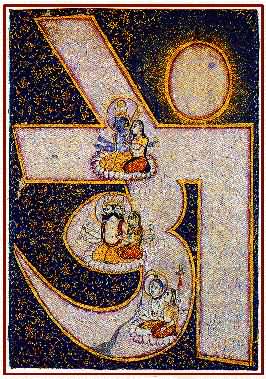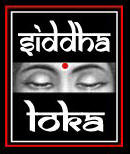|
|
 The VEDAS
The VEDAS
THE FOUNT OF
HINDU THOUGHT
An Introduction to
Vedic Literature
CLICK HERE FOR
SELECTED
READINGS FROM THE VEDAS
To understand the essence of Hinduism one must look at the oldest Hindu scriptures, called the Vedas. All orthodox Hindus recognize in them the origin of their faith and its highest written authority. The word Veda means, "to look, or to know." Who wrote the Vedas no one knows nor, with any accuracy, when they were written.
The sages and seers whose insight they embody remain wholly in the background, impersonal as the truth they stood for, their individual lives lost forever, and event
heir names.
There are four Vedas: Rg, Sama, Yajur, and Atharva. Each of these four is divided
into two parts consisting of the rituals or rites and the philosophy. The philosophical portion of the Vedas are called the Upanishads. The word Upanishad means, "sitting devotedly near."
Any subsequent scripture must be in agreement with Vedas if it is to be regarded as
valid. It may expand upon them, it may develop them, and still be recognized, but it
may not contradict them.
The following are brief summaries of various Upanishads. These basic concepts provide the foundation and framework for all Hindu thought.
I. KATHA UPANISHAD
THE secret of immortality is to be found in purification of the heart, in meditation,
in realization of the identity of the Self within and Brahman without. For immortality
is union with God.
II. ISHA UPANISHAD
LIFE in the world and life in the spirit are not incompatible. Work, or action, is not
contrary to knowledge of God, but indeed, if performed without attachment, is a means to it. On the other hand, renunciation is renunciation of the ego, of
selfishness -- not of life. The end, both of work and of renunciation, is to know
the Self within and Brahman without, and to realize their identity. The Self is Brahman,
and Brahman is all.
III. KENA UPANISHAD
THE power behind every activity of nature and of man is the power of Brahman. To realize this truth is to be immortal.
IV. PRASNA UPANISHAD
Man is composed of such elements as vital breath, deeds, thought, and the senses --
all of them deriving their being from the Self. They have come out of the Self, and in the
Self they ultimately disappear -- even as the waters of a river disappear in the sea.
V. MUNDAKA UPANISHAD
Since the manifold objects of sense are merely emanations of Brahman, to know them
in themselves is not enough. Since all the actions of men are but phases of the universal process of creation, action alone is not enough. The sage must distinguish
between knowledge and wisdom. Knowledge is of things, acts, and relations. But wisdom is of Brahman alone; and, beyond all things, acts, and relations, he abides
forever. To become one with him is the only wisdom.
VI. MANDUKYA UPANISHAD
The life of man is divided between waking, dreaming, and dreamless sleep. But transcending these three states is super conscious vision -- called the Fourth.
VII. TAITTIRIYA UPANISHAD
Man, in his ignorance, identifies himself with the material sheaths that encompass
his true Self. Transcending these, he becomes one with Brahman, who is pure bliss.
VIII. AITAREYA UPANISHAD
Brahman, source, sustenance, and end of the universe, partakes of every phase of
existence. He wakes with the waking man, dreams with the dreamer, and sleeps the
deep sleep of the dreamless sleeper; but he transcends these three states to become
himself. His true nature is pure consciousness.
IX. CHANDOGYA UPANISHAD
Brahman is all. From Brahman come appearances, sensations, desires, and deeds. But all these are merely name and form. To know Brahman one must experience the
identity between him and the Self, or Brahman dwelling within the lotus of the heart.
Only by so doing can man escape from sorrow and death and become one with the subtle essence beyond all knowledge.
X. BRIHADARANYAKA UPANISHAD
The Self is the dearest of all things, and only through the Self is anything else dear.
The Self is the origin of all finite happiness, but it is itself pure bliss, transcending
definition. It remains unaffected by deeds, good or bad. It is beyond feeling and beyond
knowledge, but it is not beyond the meditation of the sage.
XI. KAIVALYA UPANISHAD
The sage who by faith, devotion, and meditation has realized the Self, and become one
with Brahman, is released from the wheel of change and escapes from rebirth, sorrow,
and death.
XII. SVETASVATARA UPANISHAD
Meditation can be learned, and it must be practiced according to accepted rules. By
its means it is possible to realize the personal Brahman, who, in union with Maya,
creates, preserves, and dissolves the universe, and likewise the impersonal Brahman,
who transcends all forms of being, who eternally is, without attribute and without
action.


